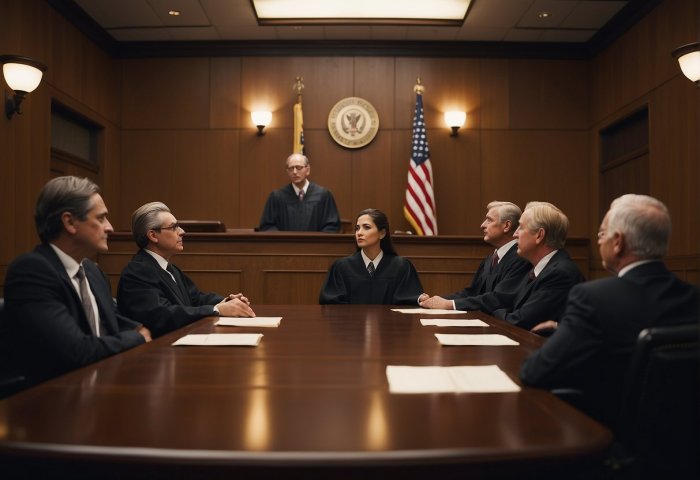Car accident court proceedings can be a complex and daunting process. Understanding the legal procedures and strategies involved is crucial for protecting your rights and obtaining a fair outcome. This guide provides a comprehensive overview of car accident court proceedings, from pre-trial procedures to post-trial considerations.
As you navigate the legal complexities of a car accident case, it’s essential to seek guidance from an experienced attorney who can advocate for your interests and ensure a favorable resolution.
1. Pre-Trial Procedures

Filing a lawsuit for a car accident involves several steps. First, the plaintiff (the person who was injured or suffered damages) must file a complaint with the court. The complaint Artikels the facts of the case and the legal claims being made.
Once the complaint is filed, the defendant (the person being sued) has a certain amount of time to respond. The defendant can file an answer, which admits or denies the allegations in the complaint.
The defendant can also file a counterclaim, which is a separate lawsuit against the plaintiff.
Navigating car accident court proceedings can be complex. Understanding the legal process is crucial, including the potential for a car crash lawsuit settlement.
This can significantly impact the outcome of your case. Seeking legal counsel is highly recommended to ensure your rights are protected and to guide you through the complexities of the legal system.
After the pleadings have been filed, the parties enter the discovery phase. Discovery is the process of gathering evidence and preparing for trial.
During discovery, the parties can request documents, interrogatories (written questions), and depositions (oral testimony under oath).
Mediation is a form of alternative dispute resolution that can be used to settle a car accident case before trial. Mediation is a confidential process in which a neutral third party helps the parties reach an agreement.
Role of Discovery in Gathering Evidence and Preparing for Trial, Car accident court proceedings
- Discovery is the process of gathering evidence and preparing for trial.
- During discovery, the parties can request documents, interrogatories (written questions), and depositions (oral testimony under oath).
- Discovery helps the parties to identify the key issues in the case and to prepare their arguments.
2. Trial Preparation: Car Accident Court Proceedings
The key elements of a car accident lawsuit include the following: liability, damages, and causation. Liability refers to who is responsible for the accident.
Damages refer to the injuries and losses suffered by the plaintiff. Causation refers to the link between the defendant’s negligence and the plaintiff’s injuries.
The plaintiff has the burden of proving liability, damages, and causation by a preponderance of the evidence. This means that the plaintiff must show that it is more likely than not that the defendant is liable for the accident and that the plaintiff’s injuries were caused by the defendant’s negligence.
Navigating the complexities of car accident court proceedings can be overwhelming, especially when seeking compensation for damages. Understanding the legal process and your rights as a victim is crucial to ensure fair compensation.
By consulting with legal professionals, you can effectively navigate the court proceedings and advocate for the justice you deserve.
The defendant can raise a number of defenses to a car accident lawsuit. Some common defenses include contributory negligence, comparative negligence, and assumption of the risk.
Navigating the intricacies of car accident court proceedings can be a daunting task. To ensure fair compensation for your injuries, it’s crucial to understand the legal process.
In some cases, a personal injury lawsuit settlement may be the most suitable option, allowing you to resolve your claim without the need for a lengthy trial.
However, it’s important to consult with an experienced attorney to determine the best course of action for your specific circumstances and maximize your recovery in car accident court proceedings.
It is important to select a qualified attorney to represent you in a car accident case. An experienced attorney can help you to investigate the accident, gather evidence, and prepare for trial.
3. Trial Proceedings
A car accident trial is typically divided into three phases: the opening statements, the presentation of evidence, and the closing arguments.
During the opening statements, the attorneys for each party present their case to the jury. The plaintiff’s attorney will argue that the defendant is liable for the accident and that the plaintiff is entitled to damages.
The defendant’s attorney will argue that the defendant is not liable or that the plaintiff’s damages are not as severe as claimed.
During the presentation of evidence, the parties will call witnesses to testify about the accident. The witnesses may include the drivers of the vehicles involved in the accident, the passengers in the vehicles, and the police officers who investigated the accident.
During the closing arguments, the attorneys for each party summarize the evidence and argue why the jury should find in their favor.
Role of the Judge, Jury, and Attorneys

- The judge presides over the trial and makes rulings on legal issues.
- The jury decides the facts of the case and determines whether the defendant is liable for the accident.
- The attorneys for each party represent their clients and present evidence and arguments to the jury.
Final Summary
Car accident court proceedings can be a challenging experience, but by understanding the legal process and working closely with a skilled attorney, you can increase your chances of achieving a successful outcome.
Remember, seeking justice and compensation for your injuries is your right, and the legal system is designed to protect your interests.
FAQ Overview
What is the statute of limitations for filing a car accident lawsuit?
The statute of limitations varies by state, typically ranging from one to three years from the date of the accident.
What types of damages can I recover in a car accident case?
Damages may include compensation for medical expenses, lost wages, pain and suffering, and property damage.
Who is liable for damages in a car accident?
Liability is determined based on the concept of negligence. The party who caused the accident through their careless or reckless actions may be held liable.




